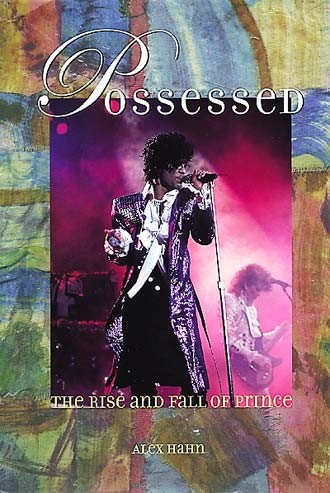It's not easy to craft a decent Prince biography. Forgetting the fact that Prince himself rarely grants interviews, you have to contend with the fact that most of his associates have been reticent over the years about talking to the media, for fear that the infamously controlling Minneapolis monarch will blackball them from his Paisley Park empire.
That might explain why the few attempts at a Prince bio up to this point have done little more than connect the dots of his discography, offering little explanation for the enigmatic twists that have driven His Royal Badness' life and career.
Alex Hahn's new Prince bio, Possessed: The Rise and Fall of Prince, doesn't necessarily feel like the definitive word on Prince, but it is by far the deepest exploration of his confounding contradictions yet published.
Maybe because Prince's commercial fortunes have dipped so precipitously over the last decade, more people than ever before seem unafraid to dish the dirt about him. To a degree, this poses a structural program with Hahn's book, because many of its most candid sources are inevitably those who think they got burned by Prince, or left him on bad terms. While you never get the sense that Hahn is driven by an Albert Goldman-like character-assassination agenda, he sometimes strains too hard to find a linear pattern to what he views as a breakdown in Prince's career and personal life.
Nonetheless, much of the raw material rings true. Hahn presents Prince as a self-centered tyrant who uses and discards people like guitar picks. Time and again, his need to dominate - and his fear of being upstaged - induces him to sabotage his own well-laid plans.
For example, Prince put together a lineup and concept for The Time, wrote and produced all their songs, and then became struck by fears that they would become too good, that he had created a Frankenstein's monster. One of the most bizarre anecdotes in Hahn's book relays how Prince and his bandmates pelted the members of The Time with food during the final show of their joint 1982 tour. When Time guitarist Jesse Johnson responded by allegedly making a derogatory on-mic reference to Prince's mother, the diminutive dictator had his bodyguard handcuff Johnson to a dressing-room coat rack, while Prince flicked Doritos at his face and verbally abused him.
| POSSESSED: THE RISE AND FALL OF PRINCE By Alex Hahn Watson-Guptill/Billboard Books $24.95, 280 pages ISBN: 0823077489 |
When Cymone talked about getting a home recording studio, Prince encouraged him to record at Prince's house instead. When Cymone took him up on it, Prince told him that he'd "accidentally" erased Cymone's tapes. Cymone also held a grievance common among Prince's musical cohorts: that Prince failed to credit them for their songwriting contributions to his material.
Prince alternately comes across as a pure, uncompromising artist - throwing out Warner Bros. executives who offered critiques at one of his early recording sessions - and a calculating impresario who justified his creation of the new-wavey mid-'80s band The Family by stating: "We've got to go after some of that Duran Duran money."
Hahn's analyses of Prince's music are not particularly insightful, and despite his best efforts, he can't fully explain why Prince's megalomania and tendency to spread himself too thin finally unhinged his career. For years, Prince thrived by controlling every note of his music, and successfully cranked out a near-endless supply of material for other artists. And while Hahn convincingly argues that Prince became more isolated over time, he had always been a loner.
Amidst all the unflattering revelations, there is also the image of Prince as a sonic visionary, a true force of nature who rarely eats or sleeps, who can seemingly work on music round-the-clock, and who plays such rich chords on the piano that stunned peers wonder if he has four hands. As Hahn points out, the discipline and creative drive remain. The real question is whether the inspiration will ever return. •


















